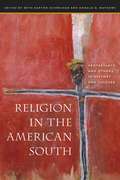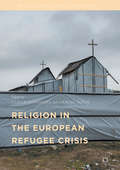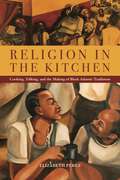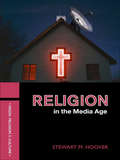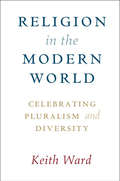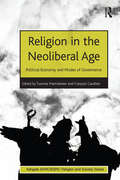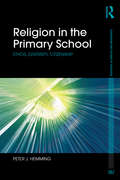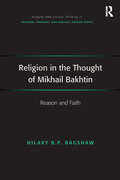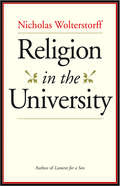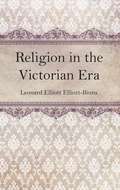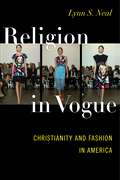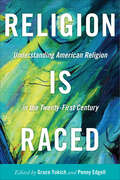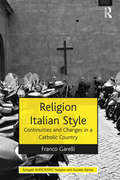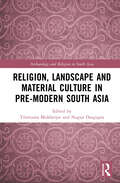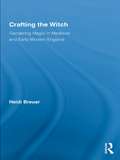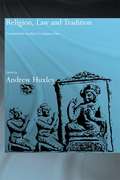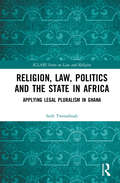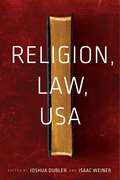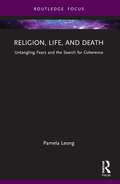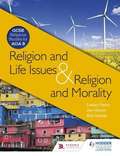- Table View
- List View
Religion in the American South
by Beth Barton Schweiger Donald G. MathewsThis collection of essays examines religion in the American South across three centuries--from the beginning of the eighteenth century to the civil rights movement of the 1960s. The first collection published on the subject in fifteen years, Religion in the American South builds upon a new generation of scholarship to push scholarly conversation about the field to a new level of sophistication by complicating "southern religion" geographically, chronologically, and thematically and by challenging the interpretive hegemony of the "Bible belt." Contributors demonstrate the importance of religion in the South not only to American religious history but also to the history of the nation as a whole. They show that religion touched every corner of society--from the nightclub to the lynching tree, from the church sanctuary to the kitchen hearth. These essays will stimulate discussions of a wide variety of subjects, including eighteenth-century religious history, conversion narratives, religion and violence, the cultural power of prayer, the importance of women in exploiting religious contexts in innovative ways, and the interracialism of southern religious history.Contributors:Kurt O. Berends, University of Notre DameEmily Bingham, Louisville, KentuckyAnthea D. Butler, Loyola Marymount UniversityPaul Harvey, University of Colorado, Colorado SpringsJerma Jackson, University of North Carolina at Chapel HillLynn Lyerly, Boston CollegeDonald G. Mathews, University of North Carolina at Chapel HillJon F. Sensbach, University of FloridaBeth Barton Schweiger, University of ArkansasDaniel Woods, Ferrum College
Religion in the Emergence of Civilization: ÇAtalhöYüK as a Case Study
by Ian HodderThis book presents an interdisciplinary study of the role of spirituality and religious ritual in the emergence of complex societies. Involving an eminent group of natural scientists, archaeologists, anthropologists, philosophers, and theologians, this volume examines à atalhÖyÜk as a case study. A nine-thousand-year old town in central Turkey, à atalhÖyÜk was first excavated in the 1960s and has since become integral to understanding the symbolic and ritual worlds of the early farmers and village-dwellers in the Middle East. It is thus an ideal location for exploring theories about the role of religion in early settled life. This book provides a unique overview of current debates concerning religion and its historical variations. Through exploration of themes including the integration of the spiritual and the material, the role of belief in religion, the cognitive bases for religion, and religion's social roles, this book situates the results from à atalhÖyÜk within a broader understanding of the Neolithic in the Middle East.
Religion in the European Refugee Crisis (Religion and Global Migrations)
by Ulrich Schmiedel Graeme SmithThis book explores the roles of religion in the current refugee crisis of Europe. Combining sociological, philosophical, and theological accounts of this crisis, renowned scholars from across Europe examine how religion has been employed to call either for eliminating or for enforcing the walls around “Fortress Europe.” Religion, they argue, is radically ambiguous, simultaneously causing social conflict and social cohesion in times of turmoil. Charting the constellations, the conflicts, and the consequences of the current refugee crisis, this book thus answers the need for succinct but sustained accounts of the intersections of religion and migration.
Religion in the Kitchen: Cooking, Talking, and the Making of Black Atlantic Traditions (North American Religions)
by Elizabeth PérezBefore honey can be offered to the Afro-Cuban deity Ochún, it must be tasted, to prove to her that it is good. In African-inspired religions throughout the Caribbean, Latin America, and the United States, such gestures instill the attitudes that turn participants into practitioners. Acquiring deep knowledge of the diets of the gods and ancestors constructs adherents' identities; to learn to fix the gods' favorite dishes is to be "seasoned" into their service. In this innovative work, Elizabeth Pérez reveals how seemingly trivial "micropractices" such as the preparation of sacred foods, are complex rituals in their own right. Drawing on years of ethnographic research in Chicago among practitioners of Lucumí, the transnational tradition popularly known as Santería, Pérez focuses on the behind-the-scenes work of the primarily women and gay men responsible for feeding the gods. She reveals how cooking and talking around the kitchen table have played vital socializing roles in Black Atlantic religions. Entering the world of divine desires and the varied flavors that speak to them, this volume takes a fresh approach to the anthropology of religion. Its richly textured portrait of a predominantly African-American Lucumí community reconceptualizes race, gender, sexuality, and affect in the formation of religious identity, proposing that every religion coalesces and sustains itself through its own secret recipe of micropractices.
Religion in the Media Age: Explorations In Media, Religion, And Culture (Media, Religion and Culture)
by Stewart M. HooverLooking at the everyday interaction of religion and media in our cultural lives, Hoover’s new book is a fascinating assessment of the state of modern religion. Recent years have produced a marked turn away from institutionalized religions towards more autonomous, individual forms of the search for spiritual meaning. Film, television, the music industry and the internet are central to this process, cutting through the monolithic assertions of world religions and giving access to more diverse and fragmented ideals. While the sheer volume and variety of information travelling through global media changes modes of religious thought and commitment, the human desire for spirituality also invigorates popular culture itself, recreating commodities – film blockbusters, world sport and popular music – as contexts for religious meanings. Drawing on research into household media consumption, Hoover charts the way in which media and religion intermingle and collide in the cultural experience of media audiences. Religion in the Media Age is essential reading for everyone interested in how today mass media relates to contemporary religious and spiritual life.
Religion in the Military Worldwide
by Ron E. HassnerHow does religion affect the lives of professional soldiers? How does religion shape militaries, their organization, procedures, and performance? This volume is the first to address these questions by comparing religious symbols and practices in nine countries: Japan, Canada, the United Kingdom, Pakistan, Israel, Iran, India, the United States, and Turkey. The contributors explore how and why soldiers pray, the role of religious rituals prior to battle, the functions that chaplains perform, the effects of religion on recruitment and unit formation, and how militaries grapple with ensuing constitutional dilemmas.
Religion in the Modern World: Celebrating Pluralism and Diversity
by Keith WardThe subject of religious diversity is of growing significance, with its associated problems of religious pluralism and inter-faith dialogue. Moreover, since the European Enlightenment, religions have had to face new, existential challenges. Is there a future for religions? How will they have to change? Can they co-exist peacefully? In this book, Keith Ward brings new insights to these questions. Applying historical and philosophical approaches, he explores how we can establish truth among so many diverse religions. He explains how religions have evolved over time and how they are reacting to the challenges posed by new scientific and moral beliefs. A celebration of the diversity in the world's religions, Ward's timely book also deals with the possibility and necessity of religious tolerance and co-existence.
Religion in the Neoliberal Age: Political Economy and Modes of Governance (AHRC/ESRC Religion and Society Series)
by François GauthierThis book, together with a complementary volume 'Religion in Consumer Society', focuses on religion, neoliberalism and consumer society; offering an overview of an emerging field of research in the study of contemporary religion. Claiming that we are entering a new phase of state-religion relations, the editors examine how this is historically anchored in modernity but affected by neoliberalization and globalization of society and social life. Seemingly distant developments, such as marketization and commoditization of religion as well as legalization and securitization of social conflicts, are transforming historical expressions of 'religion' and 'religiosity' yet these changes are seldom if ever understood as forming a coherent, structured and systemic ensemble. 'Religion in the Neoliberal Age' includes an extensive introduction framing the research area, and linking it to existing scholarship, before looking at four key issues: 1. How changes in state structures have empowered new modes of religious activity in welfare production and the delivery of a range of state services; 2. How are religion-state relations transforming under the pressures of globalization and neoliberalism; 3. How historical churches and their administrations are undergoing change due to structural changes in society, and what new forms of religious body are emerging; 4. How have law and security become new areas for solving religious conflicts. Outlining changes in both the political-institutional and cultural spheres, the contributors offer an international overview of developments in different countries and state of the art representation of religion in the new global political economy.
Religion in the Primary School: Ethos, diversity, citizenship (Foundations and Futures of Education)
by Peter HemmingReligion and its relationship to schooling is an issue that has become more and more topical in recent years. In many countries, developments such as the diversification of state school sectors, concerns about social cohesion between ethnic and religious groups, and debates about national identity and values have raised old and new questions about the role of religion in education. Whilst the significance of this issue has been reflected in renewed interest from the academic community, much of this work has continued to be based around theoretical or pedagogical debates and stances, rather than evidence-based empirical research. This book aims to address this gap by exploring the social and political role of religion in the context of the primary school. Drawing on original ethnographic research with a child-centred orientation, comparisons are drawn between Community and Roman Catholic primary schools situated within a multi-faith urban area in the UK. In doing so, the study explores a number of ways in which religion has the potential to contribute to everyday school life, including through school ethos and values, inter-pupil relations, community cohesion and social identity and difference. At the centre of the analysis are two key sociological debates about the significance of religion in late modern societies. The first is concerned with the place of religion in public life and the influence of secularisation and post-secularism on the relationship between religion and schooling. The second relates to the increasingly multi-faith nature of many national populations and the implications for religious citizenship in educational settings. Religion in the Primary School will be a useful resource for academics, researchers and students as a key addition to existing knowledge in the disciplines of education, sociology and human geography. It will also be of value to both policy-makers and educationalists interested in the role of religion in schools and the implications for the wider community and society in a range of national contexts.
Religion in the Public Sphere
by Solange Lefebvre Lori G. BeamanThe place of religion in the public realm is the subject of frequent and lively debate in the media, among academics and policymakers, and within communities. With this edited collection, Solange Lefebvre and Lori G. Beaman bring together a series of case studies of religious groups and practices from all across Canada that re-examine and question the classic distinction between the public and private spheres.Religion in the Public Sphere explores the public image of religious groups, legal issues relating to "reasonable accommodations," and the role of religion in public services and institutions like health care and education. Offering a wide range of contributions from religious studies, political science, theology, and law, Religion in the Public Sphere presents emerging new models to explain contemporary relations between religion, civil society, the private sector, family, and the state.
Religion in the Ranks
by Joanne Rennick Romeo DallaireWhat role does religion play in the Canadian Forces today? Examining the changing functions of the official religious leaders in the chaplaincy as well as the place and purpose of religion in the lives of regular military personnel, Religion in the Ranks explores this question in the context of late modernity and the Canadian secular state.In-depth interviews with chaplains and with personnel of differing spiritual beliefs offer insight into how religion affects the real life experiences of those who have endured difficult assignments, witnessed atrocities, and struggled to overcome post-traumatic stress disorder. While identifying the historic function of religion in the Canadian Forces, Joanne Benham Rennick demonstrates that spiritual interests remain important, even to those who do not consider themselves to be religious. Arguing that the leadership, practices, and beliefs rooted in religious affiliations create essential support systems for individuals, both at home and on assignment, Benham Rennick shows that there is still a place for religion in Canada's military.
Religion in the Thought of Mikhail Bakhtin: Reason and Faith (Routledge New Critical Thinking in Religion, Theology and Biblical Studies)
by Hilary B.P. BagshawThis book examines the significance of religion in the work of the twentieth century philosopher Mikhail Bakhtin. Exploring Bakhtin’s contribution to debates on methodology in the study of religion, this book argues that his use of religious terminology is derived from his source material in philosophy of religion and not from his confessional commitment to Russian Orthodox Christianity. Critiquing Gavin Flood’s important work Beyond Phenomenology, Hilary Bagshaw explains how Bakhtin’s work on ’outsideness’ presents invaluable insights for scholars of religion, particularly pertinent to the contemporary insider/outsider debate.
Religion in the University
by Nicholas WolterstorffFrom one of the world’s leading philosophers, this is a powerful defense of religion’s role within the modern university What is religion’s place within the academy today? Are the perspectives of religious believers acceptable in an academic setting? In this lucid and penetrating essay, Nicholas Wolterstorff ranges from Max Weber and John Locke to Ludwig Wittgenstein and Charles Taylor to argue that religious orientations and voices do have a home in the modern university, and he offers a sketch of what that home should be like. He documents the remarkable changes have occurred within the academy over the past five decades with regard to how knowledge is understood. During the same period, profound philosophical advancements have also been made in our understanding of religious belief. These shifting ideals, taken together, have created an environment that is more pluralistic than secular. Tapping into larger debates on freedom of expression and intellectual diversity, Wolterstorff believes a scholarly ethic should guard us against becoming, in Weber’s words, “specialists without spirit and sensualists without heart.”
Religion in the Victorian Era
by Elliott-Binns Leonard ElliottA comprehensive history of religion in Victorian England, covering such topics as religion and science, religion and society, the press, literature and art, worship, new critical methods, federation and reunion, showing both the relationship between the churches and the society in which they existed and also the major movements within the churches.
Religion in Vogue: Christianity and Fashion in America
by Lynn S. NealHow the fashion industry has contributed to religious change From cross necklaces to fashion designs inspired by nuns’ habits, how have fashion sources interpreted Christianity? And how, in turn, have these interpretations shaped conceptions of religion in the United States? Religion in Vogue explores the intertwined history of Christianity and the fashion industry. Using a diverse range of fashion sources, including designs, jewelry, articles in fashion magazines, and advertisements, Lynn S. Neal demonstrates how in the second half of the twentieth century the modern fashion industry created an aestheticized Christianity, transforming it into a consumer product. The fashion industry socialized consumers to see religion as fashionable and as a beautiful lifestyle accessory—something to be displayed, consumed, and experienced as an expression of personal identity and taste. Religion was something to be embraced and shown off by those who were sophisticated and stylish, and not solely the domain of the politically conservative. Neal ultimately concludes that, through aestheticizing Christianity, the fashion industry has offered Americans a means of blending traditional elements of religion—such as ritual practice, miraculous events, and theological concepts—with modern culture, revealing a new dimension to the personal experience of religion.
Religion Is Raced: Understanding American Religion in the Twenty-First Century (Washington Mews)
by Grace Yukich Penny EdgellDemonstrates how race and power help to explain American religion in the twenty-first centuryWhen White people of faith act in a particular way, their motivations are almost always attributed to their religious orientation. Yet when religious people of color act in a particular way, their motivations are usually attributed to their racial positioning. Religion Is Raced makes the case that religion in America has generally been understood in ways that center White Christian experiences of religion, and argues that all religion must be acknowledged as a raced phenomenon. When we overlook the role race plays in religious belief and action, and how religion in turn spurs public and political action, we lose sight of a key way in which race influences religiously-based claims-making in the public sphere.With contributions exploring a variety of religious traditions, from Buddhism and Islam to Judaism and Protestantism, as well as pieces on atheists and humanists, Religion Is Raced brings discussions about the racialized nature of religion from the margins of scholarly and religious debate to the center. The volume offers a new model for thinking about religion that emphasizes how racial dynamics interact with religious identity, and how we can in turn better understand the roles religion—and Whiteness—play in politics and public life, especially in the United States. It includes clear recommendations for researchers, including pollsters, on how to better recognize moving forward that religion is a raced phenomenon.With contributions by Joseph O. Baker, Kelsy Burke, James Clark Davidson, Janine Giordano Drake, Ashley Garner, Edward Orozco Flores, Sikivu Hutchinson, Sarah Imhoff, Russell Jeung, John Jimenez, Jaime Kucinskas, Eric Mar, Gerardo Martí, Omar M. McRoberts, Besheer Mohamed, Dawne Moon, Jerry Z. Park, Z. Fareen Parvez, Theresa W. Tobin, and Rhys H. Williams.
Religion Italian Style: Continuities and Changes in a Catholic Country (AHRC/ESRC Religion and Society Series)
by Franco GarelliItaly’s traditional subcultures - Communist, Socialist, Liberal, Republican, Right-wing - have largely dissolved and yet Catholics have retained their vitality and solidity. How can the vast majority of Italians continue to maintain some connection with Catholicism? How much is the Italian situation influenced by the closeness of the Vatican? Examining the religious condition of contemporary Italy, Religion Italian Style argues that the relationship between religion and society in Italy has unique characteristics when compared with what is happening in other European Catholic Countries. Exploring key topics and religious trends which question how the population feel - from the laity and the role of religions in the public sphere, to moral debates, forms of religious pluralism, and new spiritualities - this book questions how these affect religious life, and how intricately religion is interwoven with the nation’s fabric and the dynamics of the whole society.
Religion, Landscape and Material Culture in Pre-modern South Asia (Archaeology and Religion in South Asia)
by Tilottama Mukherjee and Nupur DasguptaThis book highlights emerging trends and new themes in South Asian history. It covers issues broadly related to religion, materiality and nature from differing perspectives and methods to offer a kaleidoscopic view of Indian history until the late eighteenth century. The essays in the volume focus on understanding questions of premodern religion, material culture processes and their spatial and environmental contexts through a study of networks of commodities and cultural and religious landscapes. From the early history of coastal regions such as Gujarat and Bengal to material networks of political culture, from temples and their connection with maritime trade to the importance of landscape in influencing temple-building, from regions considered peripheral to mainstream historiography to the development of religious sects, this collection of articles maps the diverse networks and connections across regions and time. The volume will be of great interest to scholars and researchers of history, archaeology, museum and heritage studies, religion, especially Hinduism, Sufism and Buddhism, and South Asian studies.
Religion, Language, and Power (Routledge Studies in Religion)
by Nile Green Mary Searle-ChatterjeeReligion, Language and Power shows that the language of ‘religion’ is far from neutral, and that the packaging and naming of what English speakers call ‘religious’ groups or identities is imbued with the play of power. Religious Studies has all too often served to amplify voices from other centers of power, whether scripturalist or otherwise normative and dominant. This book’s de-centering of English classifications goes beyond the remit of most postcolonial studies in that it explores the classifications used in a range of languages — including Arabic, Sanskrit, Chinese, Greek and English — to achieve a comparative survey of the roles of language and power in the making of ‘religion’ . In contextualizing these uses of language, the ten contributors explore how labels are either imposed or emerge interactively through discursive struggles between dominant and marginal groups. In dealing with the interplay of religion, language and power, there is no other book with the breadth of this volume.
Religion, Law and Society
by Russell SandbergIssues concerning religion in the public sphere are rarely far from the headlines. As a result, scholars have paid increasing attention to religion. These scholars, however, have generally stayed within the confines of their own respective disciplines. To date there has been little contact between lawyers and sociologists. Religion, Law and Society explores whether, how and why law and religion should interact with the sociology of religion. It examines sociological and legal materials concerning religion in order to find out what lawyers and sociologists can learn from each other. A groundbreaking, provocative and thought-provoking book, it is essential reading for lawyers, sociologists and all who are interested in the relationship between religion, law and society in the twenty-first century.
Religion, Law and Tradition: Comparative Studies in Religious Law
by Andrew HuxleyThis book brings together two scholarly traditions: experts in Roman, Jewish and Islamic law, an area where scholars tend to be familiar with work in each area, and experts in the legal traditions of South and East Asia, which have tended to be less interdisciplinary. The resulting mix produces new ways of looking at comparative law and legal history from a global perspective, and these essays contribute both to our understanding of comparative religion as well as comparative law.
Religion, Law, Politics and the State in Africa: Applying Legal Pluralism in Ghana (ICLARS Series on Law and Religion)
by Seth TweneboahApplying a legal pluralist framework, this study examines the complex interrelationships between religion, law and politics in contemporary Ghana, a professedly secular State characterised by high levels of religiosity. It aims to explore legal, cultural and moral tensions created by overlapping loci of authority (state actors, traditional leaders and religious functionaries). It contends that religion can function as an impediment to Ghana’s secularity and also serve as an integral tool for realising the State’s legal ideals and meeting international human rights standards. Using three case studies – legal tensions, child witchcraft accusations and same-sex partnerships – the study illustrates the ways that the entangled and complicated connections between religion and law compound Ghana’s secular orientation. It suggests that legal pluralism is not a mere analytical framework for describing tensions, but ought to be seen as part of the solution. The study contributes to advancing knowledge in the area of the interrelationships between religion and law in contemporary African public domain. This book will be a valuable resource for those working in the areas of Law and Religion, Religious Studies, African Studies, Political Science, Legal Anthropology and Socio-legal Studies.
Religion, Law, USA (North American Religions #8)
by Isaac WeinerOffers insight into the complex relationship between religion and law in contemporary America Why religion? Why law? Why now? In recent years, the United States has witnessed a number of high-profile court cases involving religion, forcing Americans to grapple with questions regarding the relationship between religion and law. This volume maps the contemporary interplay of religion and law within the study of American religions. What rights are protected by the Constitution’s free exercise clause? What are the boundaries of religion, and what is the constitutional basis for protecting some religious beliefs but not others? What characterizes a religious-studies approach to religion and law today? What is gained by approaching law from the vantage point of religious studies, and what does attention to the law offer back to scholars of religion? Religion, Law, USA considers all these questions and more. Each chapter considers a specific keyword in the study of religion and law, such as “conscience,” “establishment,” “secularity,” and “personhood.” Contributors consider specific case studies related to each term, and then expand their analyses to discuss broader implications for the practice and study of American religion. Incorporating pieces from leading voices in the field, this book is an indispensable addition to the scholarship on religion and law in America.
Religion, Life, and Death: Untangling Fears and the Search for Coherence (Routledge Advances in Sociology)
by Pamela LeongBased on a content analysis of writing assignments from a class on death and dying, this book focuses on the manner in which college students use religion to make sense of death and the dying process. Drawing on research spanning five years, the author considers the attitudes, concerns, and beliefs about death, exploring students’ perspectives on the place of religion in end-of-life issues. With attention to questions related to death anxiety, suicide, mass homicide, and the death of young children, the author examines the ways in which students draw on religion to make sense of death, religion’s function as both a source of comfort and empowerment and a source of distress, as well as the perceptions of those who resist religion. As such, Religion, Life, and Death will appeal to social scientists with interests in the sociology of young adults, and the sociology and psychology of religion, death, and dying.
Religion & Life Issues and Religion & Morality
by Kim Hands Lesley Parry Jan HayesThe only book on the market combining the two most popular AQA B GCSE Religious Studies units; Religion and Life (Unit 2) and Religion and Morality (Unit 3), ensuring that students have everything they need in one place. - Helps students engage with the content by providing an informed view of issues which affect the lives of young people today - Guides students through exam preparation and develops their exam skills with revision outlines, Top Tips and techniques sections - Helps students understand the structure and types of questions in exams with a practice paper at the end of each unit - Provides a trusted resource informed by the expert authors' many years of experience providing AQA Religious Studies content
